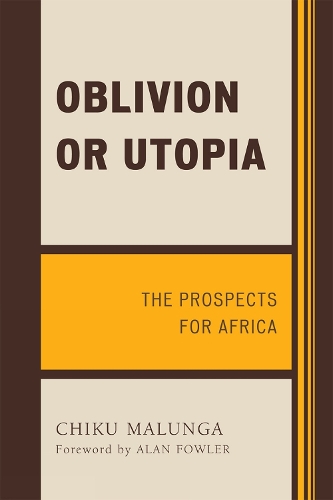
Oblivion or Utopia: The Prospects for Africa
(Paperback)
Publishing Details
Oblivion or Utopia: The Prospects for Africa
By (Author) Chiku Malunga
University Press of America
University Press of America
15th December 2009
United States
Classifications
General
Non Fiction
338.96
Physical Properties
Paperback
148
Width 155mm, Height 232mm, Spine 10mm
231g
Description
Oblivion or Utopia: the Prospects for Africa explains that most of the problems on the continent stem from the fact that, although the continent may be politically independent, it is not economically independent. Efforts to reverse the continent's continuing underdevelopment have failed to date, including trillions of dollars in aid, because they have not been consciously aimed at enabling Africa to turn its vast natural resources into wealth, which is the only known way of ensuring economic independence. Based on a comprehensive exploration of impediments to reach the goal of economic independence required for self definition, the book proposes a five step strategy which can enable the continent to turn its natural resources into wealth by:
1.Raising awareness and consciousness that Africa is not economically independent yet
2.Creating visions of aspiration
3.Organizing for wealth creation
4.Cultivating a business culture
5.Patronizing own businesses
A revolutionary implementation of the five steps, the author argues, would make utopia triumph over oblivion on the continent of Africa.
Reviews
Oblivion or Utopia is strong in its portrayal of the effect of knowledge and culture on economic processes. The deficit in knowledge to transform natural resources into wealth is so severe that universities, think tanks and civil society need mobilising across the continent in the use of knowledge as an economic lever. The task he gives these actors is to identify and address economic issues in a language that people understand. The author peppers his works with African proverbs to make sure his point gets home to those he is writing for the ordinary person in his or her community. The conviction is that when a critical number of communities on the continent changes, the country changes and eventually the continent changes. This is a bottom-up view of development reflecting the more rooted side of aid efforts. * Development in Practice *
Author Bio
Chiku Malunga is an author and a consultant with many years of experience in organization development and development practice work among African, European and American non-profits, NGOs and civil society organizations. He holds a doctorate degree in development studies from the University of South Africa. He is currently the director of Capacity Development Consultants (CADECO), an organization that promotes African- centered organizational improvement models.
Malunga's interest is in contextualizing European and American concepts of organizational/institutional development and development practice for more relevance in the developing regions of the world, and using Africa's indigenous wisdom to enrich the organizational and development theories and practice in the developed regions of the world. Malunga carries out this bridging mission through writing, consultancy and speaking engagements. His other books include: Understanding Organizational Sustainability through African Proverbs, Making Strategic Plans Work: Insights from African Indigenous Wisdom and Understanding Organizational Leadership through Ubuntu.
